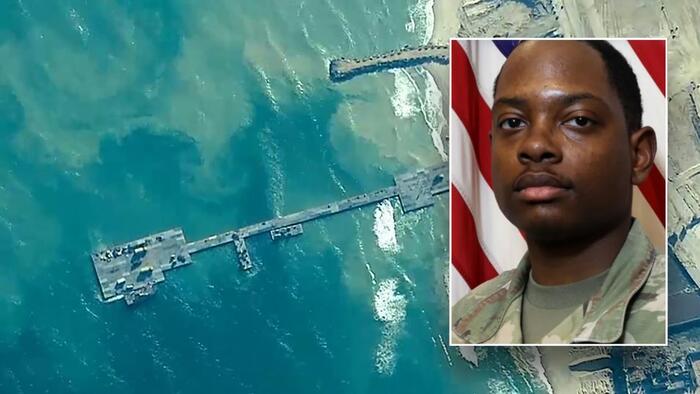In a significant development, Sgt. Quandarius Davon Stanley, a 23-year-old US Army soldier, has tragically succumbed to injuries sustained while working on a temporary pier constructed by the U.S. off the coast of Gaza. This news was reported by CNN, highlighting the circumstances surrounding his injuries and subsequent death. Stanley was among three U.S. soldiers who were injured while contributing to a mission aimed at delivering humanitarian aid to Gaza in May 2024. At the time of the incident, the Pentagon categorized the injuries as “non-combat” related; however, the details surrounding the nature of the injuries remained undisclosed. While two soldiers sustained minor injuries, Stanley’s injuries were severe enough that he required medical evacuation and eventually led to his medical retirement from military service.
The Pentagon confirmed that Stanley passed away on October 31, marking a heartbreaking outcome for his family and the wider community. An Army spokesperson revealed that Stanley had been receiving treatment at a long-term care medical center following his injuries. The pier project, which was intended to facilitate aid delivery to the besieged population of Gaza, ultimately proved ineffective. Operational for only approximately 20 days, the pier struggled against challenging weather conditions typical of the Eastern Mediterranean, leading to its repeated inoperability. The lack of significant relief for the Palestinians has drawn substantial criticism from various international aid organizations and observers.
President Biden’s decision to initiate the pier’s construction came during his State of the Union address in March. This move was met with skepticism from aid groups who characterized the pier as a public relations gesture rather than a genuine effort to address the humanitarian crisis. Many believed that the far more effective approach would have involved increasing the number of aid trucks permitted through established land crossings into Gaza. Notably, the Biden administration faced criticism for not exerting substantial pressure on Israel to facilitate greater aid access, which remains a contentious issue amidst the ongoing conflict.
Compounding the situation, insights from a report by the U.S. Agency for International Development’s (USAID) Inspector General indicated that the design and construction of the pier could obstruct broader initiatives aimed at encouraging Israel to allow increased aid through land routes. The report underscored that despite warnings regarding operational challenges posed by the typically heavy sea conditions, the administration decided to proceed with the pier project. This decision has been perceived as a miscalculation that has ultimately led to a significant waste of resources and, more tragically, the loss of a soldier’s life.
Financially, the pier project proved to be a costly endeavor for American taxpayers, with expenditures exceeding $230 million. The venture suffered substantial setbacks, including a point where it was damaged by waves, necessitating an additional $22 million for repairs. These mismanaged funds and the pier’s inefficacy raise critical questions about the decision-making processes at the highest levels of government, particularly regarding foreign intervention in crises that demand urgent and effective responses.
As discussions continue regarding the effectiveness of U.S. involvement in humanitarian operations abroad, the death of Sgt. Stanley highlights the human cost associated with such initiatives. Criticism has surfaced regarding what many perceive as poor leadership decisions within the Biden administration, which has been accused of failing to prioritize the safety and efficacy of military personnel deployed in support of humanitarian efforts. In the wake of this incident, there are calls for a reevaluation of the strategies employed to assist war-torn regions like Gaza, in order to prevent further losses and ensure that aid efforts are genuinely impactful.

